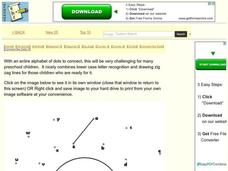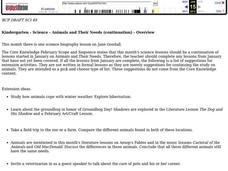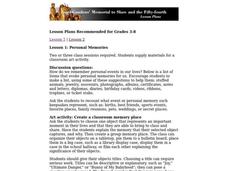Curated OER
Drawing Straight Lines
In this pre-printing practice worksheet, students use straight lines to connect a set of dots, then color the resulting picture. Page has multiple links to additional resources.
Curated OER
Tracing and Coloring Practice
In this pre-printing worksheet, learners trace the straight and curved lines in a large picture of a barn. Students color the picture any way they like.
Curated OER
Tic Tac Know Kingdoms
In this PowerPoint, students participate in a variation of tic tac toe in which questions about the animal and plant kingdom are presented and students move to various locations on the game board.
Curated OER
Printable Blank Handwriting Paper
In this handwriting skills worksheet, students practice writing on a free writing topic on the lined paper provided for them to write on.
Curated OER
Jane Goodall
Students identify Jane Goodall as a scientist who studies the behavior of chimpanzees. They listen to a biography of Jane Goodall and review the location of Africa. Then students participate in an animal observation activity.
Curated OER
Surprise in a Suitcase
Young scholars research an animal from Australia. They create a habitat (in the form of a diorama, poster, mobile, etc.) for their animal and write a coordinating paper. They present their animal and habitat to the rest of the class.
Curated OER
The New Explorers: Miracle Dolphin
Young scholars view "Miracle Dolphin" which tells the fascinating story of a fable that came true and explores both the story and the science of Holly's life among the Bedouins of Nuweiba El Muzena.
Curated OER
Emily Carr: Reading Comprehension
In this reading comprehension worksheet, students read a passage about Emily Carr. Students then attempt to determine the meanings of italicized words from the context in which they were used.
Curated OER
Understanding Estuaries
Students work together to develop their own estuarine ecosystem in an aquarium. They observe the aquarium daily and record them in a notebook. They discuss the different interactions they see with the class.
Curated OER
Cotton Ball Lamb
Learners are encouraged to recognize animal and the sounds they make. They create a hands-on craft, story-telling and song. Students share each creation with their classmates.
Curated OER
Brine Shrimp
Students gain a sense of the delicacy and complexity of a living organism and the rather narrow range of conditions under which it can live.
Curated OER
Ta-Ta- Timer
Students identify a letter of the alphabet. They recognize this letter in print and in spoken language. The letter and phoneme chosen is the letter t and /t/. They write the letter in both lower and upper case. They read 'One Tiny...
Curated OER
D says DUH! Duh?
Students identify the letter D, both upper and lower case and recognize and identify the letter d in various words and illustrations. They identify how the mouth moves with the letter D through various word pronunciations. Finally,...
Curated OER
Tick Tock /t/
Students review letter recognition for the letter /t/ and the sound of the letter /t/. They write an upper- and lower-case /t/ and recognize the sound of t as well as the letter when combined with other letters in the form of a word.
Curated OER
The Icky Sticky Igloo
Students focus on the correspondence i=/i/. They explore the sound and spelling of /i/ and discover vowels are used to spell all words in our vocabulary, so therefore it is important for students to understand the phoneme and grapheme of...
Curated OER
Amazing Apes
Learners explore the world of apes. In this reading skills lesson, students complete a jigsaw reading activity (the reading material is not included) regarding orangutans.
Curated OER
Saving Habitat
Pupils pick an animal native to Maryland and research how populations of that animal might be affected by land use changes over the past thirty years. They predict population trends for the next thirty years.
Curated OER
The Life Cycle of the Butterfly
Students examine the life of a butterfly. They write a biography from the point of view of a caterpillar using new vocabulary. They use magnifying glasses to examine butterflies and caterpillars.
Curated OER
Personal Memories
Students create an artistic classroom memory place for objects that represent an important moment in their lives.
Curated OER
What Are We?
Young scholars describe different types of water pollutants. They complete experiments in which they observe the affects of water pollution on algae. They also brainstorm and list three causes of each water pollutant.
Curated OER
Spy on a Spider
Students view slides or live specimens to name and describe the distinguishing features of groups of arthropods, especially spiders and insects. They complete worksheets, observe webs and then search for and record where spiders can be...
Curated OER
Brine Shrimp Survival
Students develop an understanding of how growth and survival of an organism depends on physical conditions. They design an artificial environment in which brine shrimp can thrive. Students determine the optimum salinity for hatching of...
Curated OER
Snail Observation Exercise
Young scholars are given a pond snail in a clear glass and asked to make observations on the snail's form and behavior. One of the key ideas is that seemly common subjects (like snails) often have surprising or interesting properties.
Other popular searches
- Domestic Animals and Pets
- Exotic Animals as Pets
- Pets Animals Art
- Animals as House Pets
- Theme Pets Animals

























